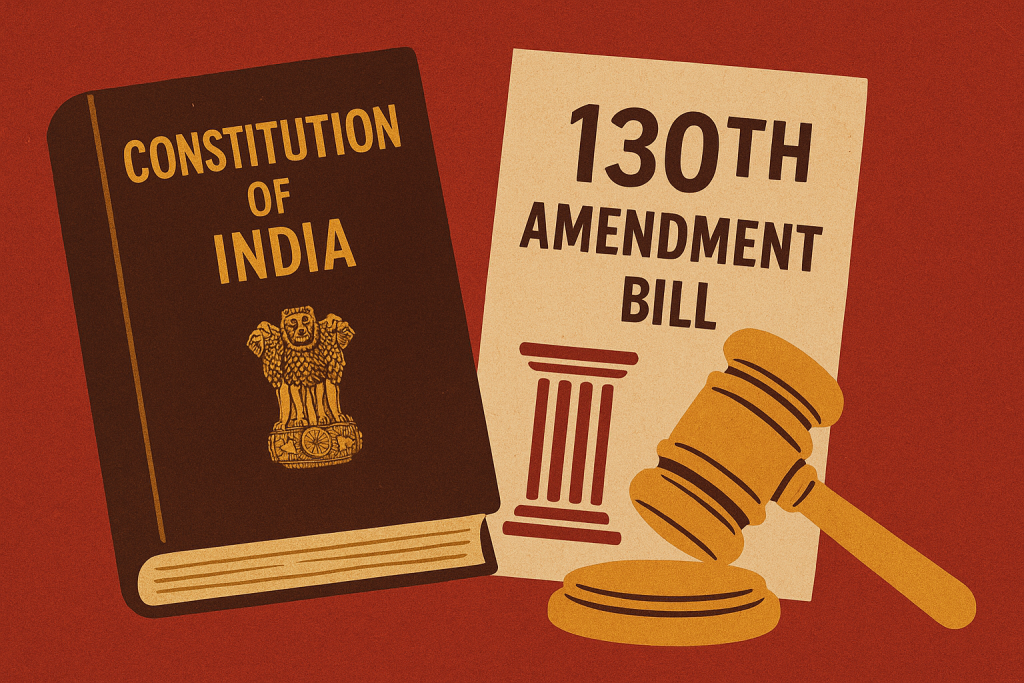
If you haven’t gotten around to reading the news yet, a new bill was introduced in August for the removal of corrupt and morally disdained leaders from our Parliament. Sounds great, right? Except there’s one small detail: they’ll be removed from office before they’re actually convicted of the crime. Even if they’re innocent.
So, how does this benefit the proposing party? Are they suddenly feeling morally righteous, or is there something greater at play here?

What does the bill propose?
We know that removing the people’s elected leaders without a proper trial or justification, based only on accusation, can hardly be called democratic. Under the guise of “cleaning” the government of corruption and wrongdoing, the ruling Centre has proposed that any minister arrested and detained in custody for 30 consecutive days on a charge punishable by at least five years of imprisonment should be removed from office (The Economic Times, 2025).
Now, on the face of it, this seems like a noble idea. In fact, if it had been applicable in 2010, even the proposing minister, Amit Shah, would have lost office for the Sohrabuddin Sheikh fake encounter case, had he not resigned. So why is the opposition against this “valiant effort”?
Let’s not forget the timing. Arvind Kejriwal’s arrest right before the election would have been an incredibly convenient coincidence for the ruling party. Once, maybe. But it wasn’t just him; opposition leaders from Jharkhand, Telangana, Kerala, and Andhra Pradesh all found themselves under ED investigation right before the Lok Sabha election.
When the ruling government has the political power to detain people on charges unheard of for years, and with no real proof, it turns into a public trial before the case ever even sees a judge. Even if the accused are proven innocent, the perception sticks. It delivers the perfect soundbite for ruling-party-affiliated media houses during election season (Newslaundry, 2020). And that’s just one of the many problems with this bill. So why propose it?
Why bring the amendment now?
Well, just like the arrests, the timing here is perfect. This bill has been introduced just days after the BJP and the Election Commission were accused of vote chori.
Rahul Gandhi, leader of the Indian National Congress and the opposition bloc, released a video claiming that fake names have been added to voter lists, ensuring the ruling party’s win, or as they call it, vote chori. One person was reportedly found registered three times with different EPIC numbers in the electoral roll.
To give you an example verified by The News Minute (Prasanna, 2025): House No. 791 in Chamundeshwari Layout has had three residents since 1991- Mala, her husband, and son. Yet the small independent house has 46 voters registered under its name.
While these are technically just allegations, the EC hasn’t exactly cleared its name. Their conduct, frankly, doesn’t look very innocent. After Rahul Gandhi’s press meet, the Election Commission did nothing significant except demand answers from him. They then announced a special revision drive in Bihar ahead of elections, affecting nearly 80 million voters (Al Jazeera, 2025). The process involves strict documentation requirements, sparking fears that vulnerable groups will be excluded, especially those who can’t produce paperwork like birth certificates, passports, or matriculation records.

Conclusion
Critics say this exercise will disproportionately impact minorities, particularly Muslims, and bar them from voting. To make things worse, Scroll found that the EC had overnight replaced digital draft voter lists in Bihar with scanned images, making investigative scrutiny much harder.
This is deeply concerning. It questions the very fabric of democracy and the spirit of the Indian Constitution, our guiding principle that we fought so valiantly for. Because if your vote no longer counts, then you no longer count. Whether you vote for the majority or not, you may no longer be choosing your own representatives (allegedly). And that, my friends, is definitely undemocratic.
So, the real question isn’t about the new bill, because that is definitely not democratic. The real question is: Did we even elect the people passing it in the first place?
Written by – Navya Agarwal
The post The New Bill: Democratic or a Distraction? appeared first on The Economic Transcript.

